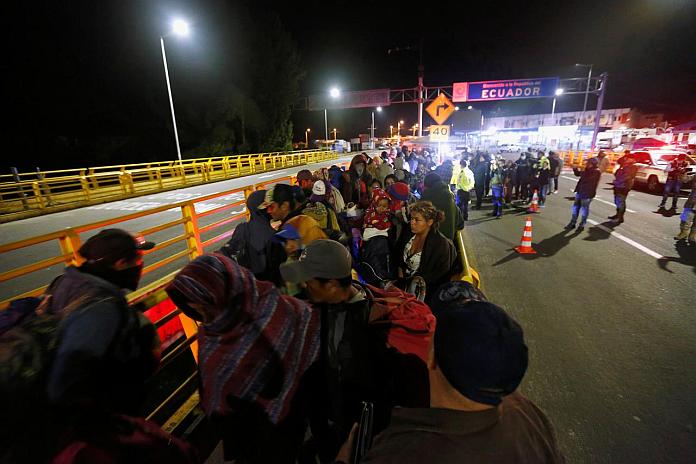By Marco Aquino, Daniela Desantis, Nelson Renteria
LIMA/ASUNCION/SAN SALVADOR (Reuters) – Countries around Latin America tightened restrictions on Monday to slow the spread of the new coronavirus, with Peru putting military personnel on the streets, Costa Rica and Colombia closing their borders and other countries ordering curfews.
While the region has yet to be hit as hard as Asia or Europe, Latin American governments have moved aggressively to contain the virus that has shut down cities and international transport hubs and battered its financial markets.
Still, not all are moving at the same tempo. A diplomatic tiff erupted when El Salvador’s president accused Mexico of allowing people with the virus to board a flight due to leave Mexico City for San Salvador. Mexico denied it.
In Colombia, authorities have overcome frosty relations with Venezuela to start sharing information about the coronavirus with their neighbor, but said that did not amount to politically recognizing the government of Nicolas Maduro.
Colombian president Ivan Duque also said the country would close its maritime, land and river borders from Tuesday to prevent the spread of the highly contagious and sometimes fatal respiratory disease, with plans to keep them shut until May 30.
Duque’s move was followed by tougher measures from Maduro, who ordered the widening of a social quarantine across the whole of Venezuela, starting on Tuesday, after the total number of cases in the country doubled to 33.
The coronavirus has been slower to reach Latin America than much of the world. Globally, over 174,100 people have been infected and nearly 6,700 have died.
In Peru, president Martin Vizcarra said leaders from Argentina, Chile, Uruguay, Paraguay, Bolivia, Colombia, Ecuador and Brazil spoke via conference call on Monday to analyze the situation and coordinate actions against the pandemic.
“We have agreed that together we are going to join forces,” he told reporters at the government palace, adding countries would look to coordinate demand for medical supplies and to calculate the economic impact on the region.
In Chile, at least six passengers from a cruise ship named the Silver Explorer were being treated in hospitals in Patagonia after they tested positive for coronavirus, the government said.
In Lima, masked military personnel blocked major roads, while police restricted the movement of people, as the country rolled out a state of enforced “social isolation”.
Peru has suspended constitutional rights such as free movement and assembly, although the government has said it will guarantee the operation of supermarkets, pharmacies, banks, basic services and the transportation of merchandise.
In nearby Paraguay, which has eight cases of the virus so far, the government said it would enforce a curfew from 8 p.m. daily to restrict crowds.
Certain people, including those doing vital work, delivering food or transportation could continue to move around, Paraguay’s interior minister, Euclides Acevedo, told a news conference.
Ecuadorean president Lenin Moreno said the Andean country would begin a curfew on Tuesday evening and shut down most normal activities with exceptions for health, safety, banking, and food production and distribution.
Panama’s government said it had now reported 69 cases of the coronavirus infection, up from 55 on Sunday.
Responses to the virus have varied greatly across Latin America, home to some 640 million people. Some countries, including Mexico and Brazil, have sought to minimize public disruptions. Others such as El Salvador have gone to considerable lengths to keep the virus out.
Salvadoran president Nayib Bukele said on Twitter he had information an Avianca flight from Mexico was due to take off with 12 coronavirus patients on board.
Avianca canceled the flight. Mexican foreign minister Marcelo Ebrard said later authorities checked the passengers and found no evidence of the virus. Meanwhile, recorded infections in Mexico rose to 82 from 53 a day earlier.
Venezuela entered the first day of a quarantine on Monday, imposed by president Nicolas Maduro to stop the virus. But many across the economically struggling country went out anyway, saying they could not afford not to work.
Chile cut interest rates to aid growth, while LATAM Airlines Group, South America’s largest carrier, cut 90 percent of international flights because of weak demand.
Chilean president Sebastian Pinera said his country, which had 155 confirmed coronavirus cases, would close its borders to foreigners starting on Wednesday.
Costa Rican president Carlos Alvarado declared a state of emergency that included shutting borders, and ordered educational authorities to close study centers for a month.
Guatemala suspended all flights and banned foreigners from entering the country for two weeks, while El Salvador and Honduras were in a state of near lockdown.
Honduras suspended various constitutional rights for a week, including freedoms of movement, speech and assembly, and imposed a nationwide curfew for the seven-day period.
Fast-food chain McDonald’s Corp (MCD.N) said on Twitter it was shutting its stores in Guatemala and El Salvador until further notice, appending a message in Spanish: “Stay at home.”





